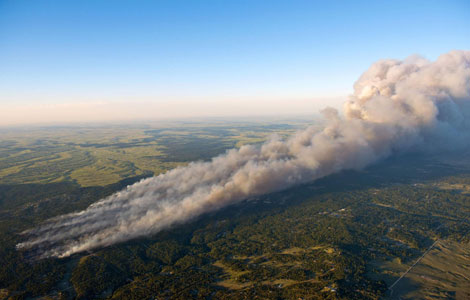
"No breakdown
A senior US official said there had been no breakdown in the negotiations and suggested that a willingness by Iranian negotiators to engage in detailed dialogue about the six nations' proposal was the most useful sign in years.
"There may not have been a breakthrough but there also was not a breakdown," the official, who requested anonymity, said. "Our intention is to proceed," the official added, referring to the powers' commitment to further diplomatic efforts.
Iranian chief nuclear negotiator Saeed Jalili acknowledged a gap in positions between the two sides.
"We proposed our plan of action and the other party was not ready and they asked for some time to study the idea," he told a separate news conference, referring to Tehran's own proposals.
Iran says it is only refining uranium to power a planned network of nuclear energy plants and for medical purposes.
Some diplomats and experts have said Iran's June presidential election fuels uncertainty in the West over the Islamic Republic's strategy for nuclear diplomacy.
The US official did not rule out that new talks could take place before the vote. But first the six powers would have to decide what steps, if any, to take to energise diplomacy.
Options
Strengthening economic sanctions, which now target Iran's vital oil industry and its banking sector, is one likely option.
"We need to absorb and digest what we heard," the official said. "And decide what makes best sense on the way forward."
Israel's Strategic Affairs Minister Yuval Steinitz warned in a statement that Iran was trying to use the negotiations to gain time to advance its uranium enrichment program.
"The Iranians are using this round of talks to pave the way to a nuclear bomb," Steinitz said, urging a more aggressive stance to make it "unequivocally clear to the Iranians that the negotiation games are finished."
Shashank Joshi, a senior fellow and Middle East specialist at the Royal United Services Institute, said: "I do not think the risk of war has substantially increased.
"The priority for both sides is to keep the diplomatic track alive until after the Iranian presidential elections."
Ashton said that for the first time there had been a "real back and forth between us when were able to discuss details ... To that extent, that has been a very important element"
But, she added: "What matters in the end is substance."
The six powers tried to persuade Iran to abandon its higher-grade uranium enrichment, as a first step to a broader deal. Refined uranium can be used to power atomic reactors.
Iran, which denies seeking nuclear weapons, wants major economic sanctions - including on its oil exports and banks - lifted and its right to enrich uranium publicly recognised.
Diplomats said one area where Iranian negotiators appeared willing to cede some ground was the demand that Tehran ship out some of its stockpile of 20 percent uranium, the sensitive product that powers worry represents an important step on route to making weapons-grade material.
One way to address the stocks could be for Iran to speed up conversion of the higher-grade uranium into reactor fuel. But that alone would not allay international concerns.
Jalili said it was Iran's "inalienable" right to refine uranium but that the activity could still be a subject for confidence-building cooperation. He did not elaborate.
The talks were held against a backdrop of flaring tension between big powers and Democratic People's Republic of Korea, which like Iran is defying international demands to curb its nuclear program.







